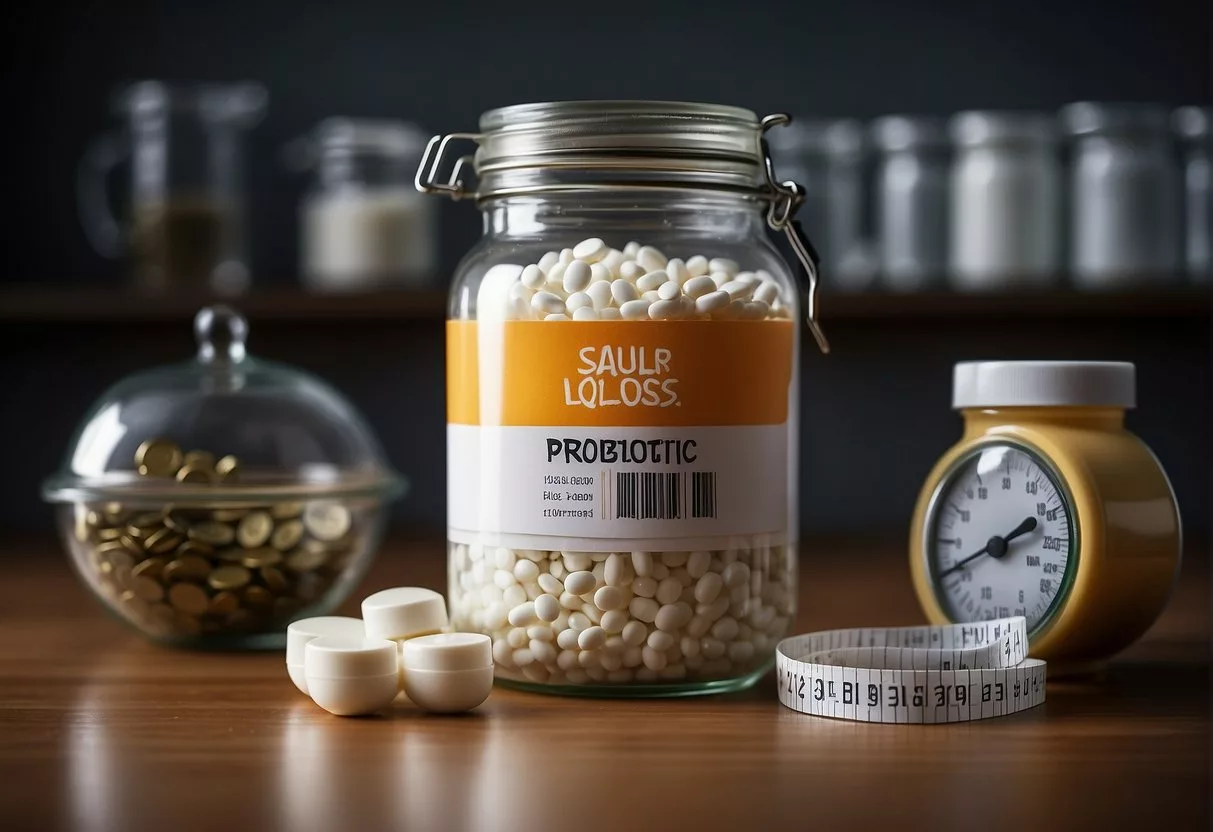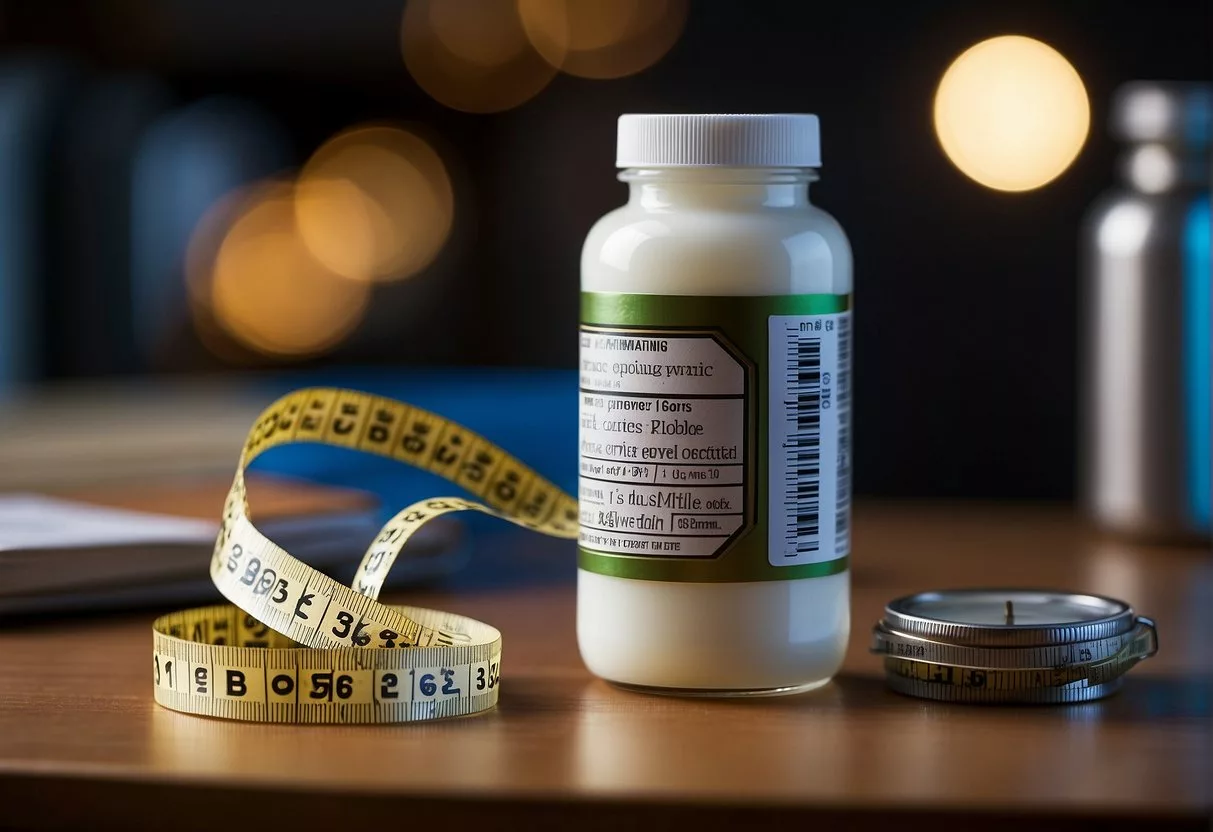The role of probiotics in weight loss has captured the attention of those seeking natural ways to shed extra pounds.
Probiotics are live microorganisms, often referred to as “good” bacteria, that provide health benefits when consumed in adequate amounts. They are found in a variety of foods and supplements, and are most commonly associated with improving digestive health.
Emerging research suggests a compelling relationship between these microorganisms and weight management, positioning probiotics as a potential ally in the battle against obesity.

Through the modulation of the gut microbiota, probiotics have been theorized to influence body weight and fat distribution.
Specific strains of probiotics may help by reducing appetite, improving energy metabolism, and decreasing fat storage. Consuming probiotics could encourage a more favorable balance of gut bacteria, which can lead to a reduction in inflammation—an underlying factor in obesity.
However, the effectiveness of probiotics for weight loss can depend on a multitude of factors, including the specific strains used and the individual’s existing gut flora.
Key Takeaways
- Probiotics may play a role in weight loss by modifying the gut microbiota.
- Specific probiotic strains can potentially reduce fat storage and decrease inflammation.
- Individual factors and the type of probiotic strains affect the effectiveness in weight management.
What are Probiotics?
Probiotics are living microorganisms that, when ingested in adequate amounts, confer health benefits on the host. These benefits are often related to the gut microbiome, where probiotics can play a significant role.
Definition and Functions
Probiotics are a class of beneficial bacteria or yeasts that naturally reside in the human body, forming a critical part of the gut microbiome. They contribute to the body’s overall health by performing several key functions:
- Maintaining a balanced gut microbiota: Probiotics help in maintaining the balance between beneficial and harmful bacteria.
- Supporting the digestive system: They aid in breaking down food and absorbing nutrients.
- Enhancing immune function: By interacting with the mucosal immune system, probiotics can influence systemic immune responses.
- Producing bioactive compounds: Certain probiotic strains secrete substances that can have direct health effects.
Probiotic Strains and Their Roles
Each probiotic strain serves a specialized function and may affect the body differently. The two most common genera of probiotics include:
- Lactobacillus: These bacteria are commonly found in the digestive, urinary, and genital systems. They can also be in some fermented foods like yogurt. Known for influencing gut health, some strains of Lactobacillus are associated with weight loss and belly fat reduction.
- Bifidobacterium: This type of probiotic can be found in dairy products. They are believed to assist in maintaining a healthy gut microbiome. In the context of weight management, a particular strain, Bifidobacterium lactis, has been linked to regulating body fat mass when taken in specific doses.The specific roles of different probiotic strains can vary widely, highlighting the importance of understanding the particular benefits and the right strains to address specific health conditions or goals.
The Link Between Probiotics and Weight Loss

Emerging research suggests a significant relationship between the gut microbiota and body weight management, highlighting Lactobacillus gasseri and Lactobacillus rhamnosus as potentially beneficial in reducing body fat and waist circumference.
Gut Microbiota and Obesity
The human gut is inhabited by trillions of bacteria, collectively known as the gut microbiota, which play a crucial role in health and disease.
Obesity has been associated with imbalances in this complex ecosystem, characterized by a reduced diversity of beneficial bacteria and an increase in pathogenic microbes. This imbalance may contribute to increased energy extraction from food, fat deposition, and chronic low-grade inflammation, all of which are key contributors to weight gain and obesity.
Impact of Probiotics on Body Weight
Probiotics for weight loss may exert their effects through several mechanisms, such as modulation of gut microbiota, alteration of fat storage, and appetite regulation.
Studies have shown that certain probiotic strains, specifically Lactobacillus gasseri, are linked to a reduction in body fat and waist circumference.
Moreover, the probiotic Lactobacillus rhamnosus has been found to aid weight loss in overweight individuals by influencing appetite-controlling hormones and inflammatory markers.
It is important to note that while probiotics show promise, their impact can vary based on the strain, dosage, and individual factors related to the host’s existing gut flora and lifestyle.
Health Benefits Beyond Weight Loss

Probiotics offer an array of health benefits that extend far beyond the realm of weight loss. They play a critical role in enhancing digestive health and bolstering immune function through the interaction with gut bacteria.
Digestive System Support
Probiotics are lauded for their beneficial effects on the digestive system. They contribute to a balanced gut microbiome, which is crucial for the effective breakdown and absorption of nutrients.
Lactobacillus strains, in particular, are known to promote the digestion of fibers and can reduce symptoms associated with gastrointestinal disorders.
Clinical studies suggest that a regular intake of probiotics may alleviate common digestive issues, such as irritable bowel syndrome, by mitigating inflammation within the gut.
Immune System Enhancement
The interplay between probiotics and the immune system is complex, yet they have a notable synergy.
Probiotics support the immune system by improving the gut barrier and competitive exclusion of pathogenic bacteria.
These beneficial gut bacteria are associated with enhanced immune responses, as they help train immune cells to distinguish between harmful invaders and non-threats.
The reduction in gut inflammation, triggered by a healthy probiotic presence, also has ramifications for systemic inflammation and overall immune function.
Consequently, incorporating probiotics into one’s diet can be part of an effective strategy to boost immunity.
Incorporating Probiotics into Diet

Incorporating probiotics into one’s diet effectively can support gut health and potentially aid in weight management. It involves choosing the right food sources and supplements that contain beneficial bacteria.
Food Sources of Probiotics
Yogurt: One of the most accessible sources of probiotics is yogurt, which often contains live cultures that can benefit gut health. Look for products that specify “live and active cultures” to ensure they contain probiotics.
Fermented Foods: Aside from yogurt, incorporating fermented foods such as kefir, sauerkraut, and kimchi provides a dietary source of probiotics. These foods have undergone a fermentation process, creating beneficial bacteria important for gut health.
Probiotic Supplements and Their Selection
Dietary Supplements: For those looking to boost their probiotic intake beyond food sources, dietary supplements can be an option. Products like VSL#3[1] and Culturelle Metabolism + Weight Management[2] capsules are designed to deliver high concentrations of probiotics.
Supplement Selection: When selecting a probiotic supplement, consider the reputation of the manufacturers and the strains of probiotics offered. A prebiotic component can also be beneficial, as it serves as food for probiotics, enhancing their effects.
Make sure to choose supplements that have been rigorously tested for efficacy and safety.
Optimizing Probiotic Effectiveness

To enhance the weight loss benefits of probiotics, one must consider the interplay of diet, lifestyle, and the specific characteristics of the probiotic supplement, such as the CFU count.
The Importance of Diet and Lifestyle
Integrating probiotics such as Lactobacillus gasseri into one’s diet is a positive step towards weight management but must be complemented by dietary and lifestyle modifications.
A fiber-rich diet feeds a healthy gut, creating an environment that supports probiotic bacteria. Adequate physical activity assists not just with caloric burn but also in maintaining a balanced gut microbiome.
Attention should be given to consuming a balanced intake of carbohydrates, proteins, and other nutrients to optimize digestion and overall health.
Understanding the CFU Count
The CFU, or colony-forming units, indicates the number of viable bacteria in a probiotic. Understanding the CFU count is crucial as it affects the probiotic’s efficacy.
Supplements with a higher CFU count may offer better support for weight management and BMI reduction. However, the quality and the suitability of the probiotic strains are also important. Sometimes a single-strain can be effective, while other times a multi-strain product is preferable.
It’s essential to choose a probiotic with an appropriate CFU count that can survive stomach acid to reach the gut.
Potential Side Effects and Considerations

While probiotics are often safe and beneficial, they can cause side effects and some populations may need to approach them with caution.
Possible Adverse Reactions
Individuals starting probiotics might experience digestive symptoms such as gas, bloating, and constipation. For some, these effects diminish over time.
However, there are also cases of allergies to probiotic strains, which may cause serious adverse reactions. Ingesting probiotics can sometimes lead to an increase in thirst, or a temporary spike in digestive discomfort as the body adjusts to the new bacterial balance.
Special Considerations for Certain Populations
For those with immunocompromised conditions, caution is advised when introducing probiotics into their routine. Probiotics can alter the microbial balance in the gut, which might not be favorable for individuals with weakened immune systems.
- Irritable Bowel Syndrome (IBS): Some strains of probiotics may alleviate symptoms for people with IBS, but it’s crucial to choose the right type.
- Inflammatory Bowel Disease (IBD): The benefits of probiotics for IBD are being investigated. There is no universal recommendation, so one should consult healthcare providers before use.
People with pre-existing health conditions should always consult with their healthcare provider before starting probiotic supplements to ensure they are appropriate and safe.
Scientific Research and Evidence

Scientific inquiry into probiotics has provided insights into their potential role in weight management and obesity treatment. This exploration includes numerous clinical studies and expert analyses, focusing on specific strains of bacteria and their impact on human health.
Clinical Studies on Probiotics
Clinical studies have investigated the effects of probiotics on weight loss.
In subjects with overweight or obesity, a variety of probiotic strains, such as Lactobacillus and Bifidobacterium, have been assessed for their influence on body weight and fat distribution.
A systematic review suggests that there is potential for probiotics and synbiotics to affect weight, particularly through the alteration of the gut microbiota composition. Effects of Probiotics and Synbiotics on Weight Loss[3] highlights evidence from randomized clinical trials indicating the complex relationship between gut bacteria strains such as Bacteroidetes and Firmicutes, and the regulation of body weight.
Research also suggests a link between probiotics and improved metabolism, including enhanced insulin sensitivity and short-chain fatty acid production, which may influence appetite regulation.
The intervention with probiotic supplements has shown promise in modifying gut balance, possibly leading to reductions in visceral fat and insulin resistance which are key factors in obesity.
Expert Consensus and Recommendations
Experts in the field of microbiome research recognize that while the quality and potency of probiotic supplements may vary, the evidence supports the reasonable inclusion of specific strains such as Lactobacillus and Bifidobacterium in weight management strategies.
The potential health benefits of probiotics extend beyond weight loss, potentially aiding in conditions such as irritable bowel syndrome (IBS) and inflammatory bowel disease (IBD).
However, experts stress the necessity of high-quality research to understand the impact of probiotics fully. Probiotics for the Treatment of Overweight and Obesity[4] discusses the complexity of the intestines microbiota and the role that probiotic supplementation could play in the prevention and treatment of obesity.
Recommendations often include considering bacteria strains, the iron-clad integrity of scientific studies, and the level of firmicutes to bacteroidetes ratio in the gut before making probiotic recommendations.
It is with this evidence in mind that the health community continues to explore how Streptococcus and other gut bacteria affect systemic health and the management of disease.
Regulations and Quality Assurance

When incorporating probiotics for weight loss, consumers must understand the complex landscape of regulations and quality assurance measures that govern these products. The industry operates under the vigilance of the FDA, and manufacturers are expected to adhere to stringent standards to ensure safety and efficacy.
Industry Standards and FDA Oversight
Dietary supplements, including probiotics such as VSL#3 and New Chapter Weight Management Probiotic, fall under the regulatory purview of the FDA. However, these products are not as heavily regulated as pharmaceuticals.
The FDA does not approve dietary supplements for safety and effectiveness before they are marketed. Manufacturers are responsible for ensuring that their products are safe, accurately labeled, and that the claims made are substantiated by adequate evidence.
For probiotic products, the number of colony-forming units (CFUs) is a crucial metric highlighted in regulatory scrutiny, ensuring that consumers are informed about the potency of the probiotics they consume.
Moreover, products like Bariatric Advantage FloraVantage Control[5] and RenewLife Healthy Weight 2-in-1[6] are tested for the absence of GMOS and the presence of probiotic strains that can withstand antibiotic use. Although regulated to an extent, the burden of quality assurance largely falls on the manufacturers themselves.
Choosing High-Quality Probiotic Products
When selecting probiotics, consumers should look for products that provide sufficient information about their CFUs and specific strains, such as Lactobacillus or Bifidobacterium.
High-quality probiotics will offer transparency regarding their formulation and often undergo third-party testing, as seen with supplements like MindBodyGreen Probiotic+.
- Transparency: Look for detailed label information indicating strain specificity, CFU counts, and storage requirements.
- Third-party Validation: Reputable products often have their quality and potency validated by independent certifiers.
- Clinical Studies: Some products, such as synbiotic supplements, may even present clinical studies backing their health effects claims.
Frequently Asked Questions

This section addresses common inquiries about the role of probiotics in weight management, detailing specific strains, their effects on belly fat, and the timeframe for potential results.
What are the most effective probiotic strains for managing weight?
Certain probiotic strains, such as Lactobacillus gasseri, Bifidobacterium lactis, and Lactobacillus rhamnosus, have been associated with weight management benefits in various studies.
Can taking probiotics lead to a reduction in belly fat?
Specific strains, especially Lactobacillus gasseri, have shown promise in reducing abdominal fat as part of controlled research studies.
How long does it typically take to see weight loss results from probiotics?
Weight loss results from probiotics can vary by individual, but studies suggest it might take six months of consistent intake to observe changes in body fat mass and waist circumference.
Is there a connection between taking Lactobacillus gasseri and weight loss?
Research has indicated that the probiotic strain Lactobacillus gasseri may help reduce body weight, particularly targeting abdominal fat.
Do prebiotics also play a role in weight management?
Prebiotics act as food for beneficial gut bacteria and can support probiotic function, which may indirectly contribute to weight management[7].
Are there any evidence-based reviews on probiotics and their effect on weight loss?
Evidence-based reviews, like those by Forbes Health[7] and Healthline[8], compile research findings on the efficacy of various probiotic strains for weight loss.
References
- Amazon.com: VSL #3® Probiotics for Digestive Health, IBS & UC Symptoms - 112.5B CFUs, High-Potency, Multi-Strain, Live, Refrigerated Probiotic, Me.... https://amzn.to/3UwVL07 Accessed October 31, 2025
- Amazon.com: Culturelle Probiotic Capsules for Healthy Metabolism & Weight Management (Ages 18+) - 30 Count - Helps Manage Weight & Promote Metaboli.... https://amzn.to/4adnQQ3 Accessed October 31, 2025
- Effects of Probiotics and Synbiotics on Weight Loss in Subjects with Overweight or Obesity: A Systematic Review. https://www.ncbi.nlm.nih.gov/pmc/articles/PMC8540110/ Accessed October 31, 2025
- Probiotics for the Treatment of Overweight and Obesity in Humans—A Review of Clinical Trials. https://www.ncbi.nlm.nih.gov/pmc/articles/PMC7465252/ Accessed October 31, 2025
- Amazon.com: Bariatric Advantage Chewable FloraVantage Probiotic - 10 Billion CFUs - Probiotic Supplement - for Gut Health & Immune System - Vegetar.... https://amzn.to/3y6DQGe Accessed October 31, 2025
- Amazon.com: Renew Life Women's Probiotic Capsules, 50 Billion CFU Guaranteed, Supports pH Balance, Vaginal, Urinary, Digestive and Immune Health(2).... https://amzn.to/44Aj7qw Accessed October 31, 2025
- Best Probiotics For Weight Loss: Expert Reviewed – Forbes Health. https://www.forbes.com/health/weight-loss/best-probiotics-for-weight-loss/ Accessed October 31, 2025
- 4 Best Probiotics for Weight Loss in 2025. https://www.healthline.com/nutrition/best-probiotics-to-support-weight-loss Accessed October 31, 2025
